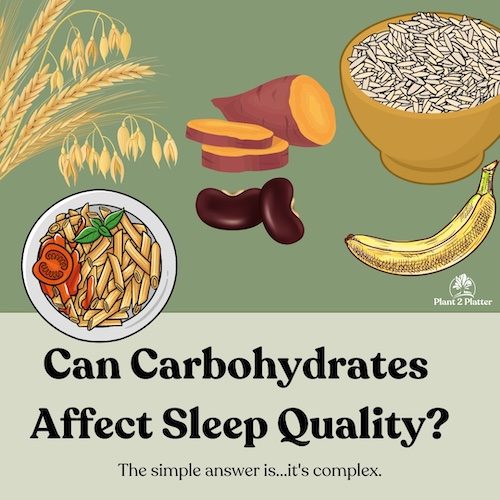Have you ever wondered why you feel tired, sluggish, and ready for a nice long nap after eating a large meal? Does this feeling remind you of the holidays or a trip to a favorite restaurant? There may be a reason for this sensation and a link between what you eat and sleep quality.
Explaining Metabolism
Dinnertime meals are often larger in portion size and may contain a significant amount of carbohydrates. High-carbohydrate foods, including bread, pasta, rice, fruit, and starchy vegetables, are some of many sources of carbohydrates. First, it is best to understand more about the metabolism, or break down, of carbohydrates into fuel for the body. Carbohydrates are metabolized more rapidly compared to other macromolecules, such as protein and fat. These foods provide quick energy in the form of glucose (a fuel source for your body). However, the body produces a byproduct when breaking down carbohydrates, which is carbon dioxide or CO2. When a large amount of CO2 is produced, the end result may be one of many reasons you feel tired after consuming a substantial meal.
Carbohydrates and Sleep
Does this mean that carbohydrates may help with sleep? The answer is more complicated than you might think. Many studies have researched the effects of carbohydrates on sleep quality. A 2016 review identified studies looking at composition of meals and how different macromolecules impact sleep. These studies have shown that a high-carbohydrate meal with around or over 80% of total calories from carbohydrates is associated with the sleep cycle, termed Rapid-Eye Movement (REM), and decreased short-wave sleep. Sleep can be divided into REM and non-REM where REM is defined by Harvard Health as the dreaming sleep cycle designed to “restore the brain.” Short wave sleep is one of three cycles of non-REM sleep and is defined as deep sleep helping the body repair. The researchers argued that the body relies on more carbohydrates as the primary fuel source during REM. However, the review found no significant evidence that high-carbohydrate meals improved the time it took to fall asleep, or sleep onset latency.
What Do Clinical Trials Reveal?
A 2016 clinical trial found similar results when comparing sleep cycles between the consumption of a fixed meal with 53% of calories from carbohydrates and a meal chosen by the participant. While the proportion of carbohydrates did not differ between the two types of meals, the fixed meal was associated with less time attempting to fall asleep. Fiber was also associated with deeper sleep cycles, while sugar was associated with more nighttime awakening. The 2016 review also found that meals with a higher glycemic index, or foods that raise blood sugar quickly, do increase the time it takes to fall asleep. Mixed meals with less sugar and more fiber were associated with reduced arousal during sleep.
The emphasis on types of carbohydrates should be emphasized. In 2018, 22 adults who received an average 5-7 hours of sleep per night underwent an extensive sleep extension program. When compared to a control group, the group receiving the sleep extension program improved the number of hours slept per night. However, contrary to other studies, the participants did have a decline in sleep quality, but the researcher argued this may be due to changes in sleep routine as a result of the sleep extension program leading to only short-term declines in sleep quality. While this group decreased their free sugar consumption by about 10 grams, it is difficult to conclude if free sugars are directly correlated to more sleep. Instead, this evidence does support the claim that specific types of carbohydrates may be associated with sleep quality and duration.
How to Influence Quality ZZZs

In light of this nutrition evidence, what should you do to influence better sleep at night? These tips may be helpful:
- Focus on complex carbohydrates versus simple carbohydrates. Consume a whole-grain carbohydrate source (such as brown rice) or a food with fiber (vegetables anyone?). This will initiate slow digesting of carbohydrates which could be beneficial for helping with sleep quality.
- Eat the dinner meal 2-4 hours before bedtime to allow for easier digestion and so you do not feel full and uncomfortable when preparing for sleep.
- Aim for a balanced meal with protein, fat, and carbohydrates. While carbohydrates may help with sleep, protein and fat will keep you full for longer, so you do not feel restless and hungry before bed.
There is never one perfect food or the perfect plate to aid in sleep when it comes to an evening meal. Finding a meal to make you feel comfortable and relaxed before bed will often look differently for each person. Experiment with new foods to figure out which foods promote the best night’s sleep for you so that you feel energized for the subsequent day.
Corrin Kalinich, MS in Nutrition Candidate, Dietetic Intern
CITATIONS (Research articles may require membership access):
- https://www.ncbi.nlm.nih.gov/pmc/articles/PMC5015038/
- https://www-ncbi-nlm-nih-gov.liboff.ohsu.edu/pmc/articles/PMC4702189/
- https://www-ncbi-nlm-nih-gov.liboff.ohsu.edu/pmc/articles/PMC5972593/

